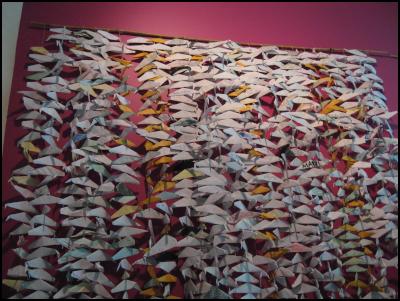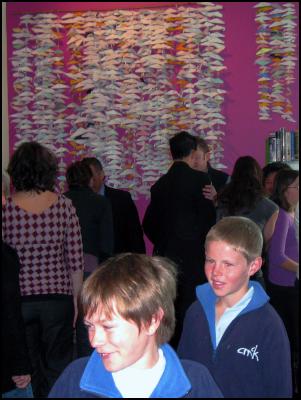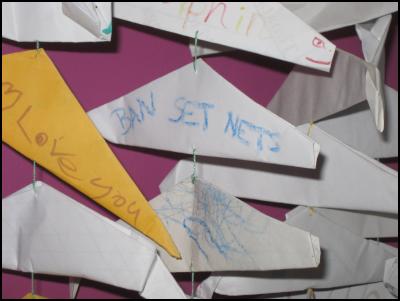NZ on Brink of Losing Maui's Dolphins to Extinction

Click to enlarge 1,000 origami dolphins at Te Papa.

Click to enlarge Students from Raglan helped make the origami figures.

Click to enlarge
More than one thousand delicately folded papers hang on the far wall of the Nature Space Discovery Centre at Te Papa, half a dozen Raglan students stand by, poised and quiet, seemingly in full comprehension of the seriousness of the message they have worked to convey. Raglan students combined efforts to fold 1,111 origami dolphins, in hopes that their wish of stabilising the diminished population of Maui's dolphins -- now dangerously low at 111 -- will be granted. The production of 1000 paper dolphins complies with the Japanese legend which states that making 1000 origami figures will fulfil a wish. The additional 111 dolphins represent the number of Maui’s dolphins in existence today.
"We
want to raise awareness," asserts Whirinaki
Maniapoto-Waitere, head boy of Raglan Area School, who spoke
on behalf of his school and community at the event. When
asked what has brought the Maui's dolphins to the brink of
extinction he replies sombrely, "Commercial and recreational
factors, but also carelessness."
Commercial set nets
as well as recreational trawl and gill nets cast off the
west coast of the North Island have trapped countless Maui's
since the 1970s. The increase in sea pollution and boating
accidents have also contributed to the diminished number of
dolphins presumed to exist today.
"I am almost
positive there are even less than that today," says Anton
van Helden, Te Papa's resident marine mammal scientist, as
he gestures to the 111 origami dolphins. Van Helden has seen
the demise of the Maui's first hand, going out to where the
animals have been netted or beached with mortal injuries.
New Zealanders, van Helden states, would be "appalled" upon
discovering the ongoing destruction that has diminished the
native sea mammal's population. "They're our treasure, and
we need to be responsible." Though other countries in the
Asia-Pacific region have been chided for their lack of
conservationist efforts, New Zealand would be the first
nation to lose a native marine mammal to extinction were the
Maui's dolphins to die out. Van Helden is resolute in his
reasoning, "We need to watch over our own patch."
Van
Helden lead students from Raglan communities in making the
1,111 origami dolphins which were presented in the Nature
Space Discovery Centre this morning.
Jim Anderton,
Member of Parliament and previous Minister of Fisheries
addressed the students, teachers, parents, and WWF
representatives present at the event: "We must ensure that
future generations will enjoy the same resources as we
have." Anderton emphasised the importance and effectiveness
of "just one person" in the realm of conservation and
raising environmental awareness.
"Love You", "Save
Us" and "No More Set Nets" are just some of the messages
written in pencil and crayon on the hundreds of paper
dolphins hanging in the Discovery Centre. Anderton looked to
the students, "The hope for our future is you."
For
more information about Maui's dolphin and what can be done
to aid in their conservation visit the following link to the
WWF website : http://www.wwf.org.nz/take_action/campaigns_appeals/hector_s_and_maui_s_campaign_/
For more information about the role of the Ministry of Fisheries in the conservation effort visit the following website : http://www.fish.govt.nz/en-nz/default.htm
ENDS


 Binoy Kampmark: Closed For Business - The Oddities Of Trump’s Tariffs
Binoy Kampmark: Closed For Business - The Oddities Of Trump’s Tariffs Martin LeFevre - Meditations: Teach Children The Distinction Between The World And Nature
Martin LeFevre - Meditations: Teach Children The Distinction Between The World And Nature Ramzy Baroud: Civil War On The Horizon? The Ashkenazi-Sephardic Conflict And Israel’s Future
Ramzy Baroud: Civil War On The Horizon? The Ashkenazi-Sephardic Conflict And Israel’s Future Gordon Campbell: On The Government’s Latest Ferries Scam
Gordon Campbell: On The Government’s Latest Ferries Scam Peter Dunne: Dunne's Weekly - While We're Breaking Up Monoliths, What About MBIE?
Peter Dunne: Dunne's Weekly - While We're Breaking Up Monoliths, What About MBIE? Adrian Maidment: Supermarket Signs
Adrian Maidment: Supermarket Signs